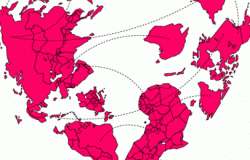Is this the Right Moment to Reboot the Aid, Trade and Private Sector Agenda?

Oxfam’s private sector adviser Erinch Sahan thinks the times are ripe for a paradigm shift
In a former life (i.e. six years ago), I worked as a development adviser to Australia’s trade negotiators. Back then, we development types were suspicious and hostile – we feared that rich countries would divert aid to pursue a narrow interpretation of their national interests.
Now, from TPP to the UK’s multiple post-Brexit negotiations, trade is back on the agenda – is this a moment to go on the front foot (sorry – Aussies, cricket etc), bringing to the table the more ambitious vision that the development sector has always had? Here’s my pitch.
We all agree, a different kind of firm is needed, is possible, and could flourish
We all know of the growing chorus of voices proclaiming that today’s business structures aren’t leading to the shared prosperity we all want. From the Chairman of Danone to the Chief Economist at the Bank of England to the business think-tank Tomorrow’s Company, thought-leaders are increasingly aware of the need to change the structure of the corporation. This is because today’s mainstream businesses are engineered to channel as much wealth as possible to shareholders and can only ‘do good’ if it happens to involve the highest return on investment. The percentage of  profits going to shareholders has risen from 10 percent in the 1970s to 70 percent today for UK companies. US companies are on a similar trajectory of increasingly channelling wealth to shareholders (more than half of profits now go to share buy-backs) rather than reinvesting in their operations and people. Meanwhile, as Thomas Piketty and others point out, the share of income going to labour is declining. And as those of us working on agriculture know all too well, the share of value going to farmers is also on the decline.
profits going to shareholders has risen from 10 percent in the 1970s to 70 percent today for UK companies. US companies are on a similar trajectory of increasingly channelling wealth to shareholders (more than half of profits now go to share buy-backs) rather than reinvesting in their operations and people. Meanwhile, as Thomas Piketty and others point out, the share of income going to labour is declining. And as those of us working on agriculture know all too well, the share of value going to farmers is also on the decline.
Companies are structured to always prioritise channelling income to their shareholders. Boards represent shareholder interests, even if they are at liberty to consider other stakeholders. Since the rich own a disproportionate amount of shares, engineering companies to be concerned only with the welfare of their shareholders means engineering our economy to care disproportionately for the rich.
Theresa May is proposing to change this by putting workers on boards and a number of initiatives are looking to reengineer the company so it isn’t just a vehicle to channel wealth to shareholders (Purpose of the Corporation, Blueprint for Better Business, the Aspen Institute’s Purpose Project to name just a few). Meanwhile, alternative models of business that put purpose before profit are on the rise: the Benefit Corporation movement is growing, employee-ownership is on the rise, social enterprises are expanding, fair trade businesses remain resilient and cooperatives continue to grow. In fact, the aid world has played a part in the growth of some the best models going around, including b. A different form of business is becoming possible just as agreement grows that the status quo needs a shake-up. The aid world should embrace this.
We don’t have to change today’s companies, we can build alternatives
We don’t have to start with today’s big business. The business landscape in 20 years will look very different, and the aid, trade and economic policies of today will determine what those businesses look like. For instance, according to a study of listed US companies, the average company only lives for 15 years. This means shaping those on the rise is more important than reengineering today’s giants. With their main growth surge still ahead of them, developing countries are a great place to create a different kind of business world. That’s where aid and trade come together nicely.
Aid and trade can promote economies dominated by businesses structured to share prosperity
Imagine aid and trade policies singing from the same hymn sheet, with civil society and progressive business voices joining in. What would be a simple vision from say, the UK government, which uses aid and trade levers, alongside domestic economic policies, to promote business structures designed to share prosperity within both the UK economy and its trading partners in the developing world? It could include the following measures to support businesses deliberately structured to share prosperity:
- Aid programmes providing access to finance (e.g. credit guarantee schemes)
- Private equity funds (e.g. via CDC) financing conversion to employee-ownership in developing countries
- Favourable access to the UK market for such business structures
- Support to special Economic Zones for social enterprises (e.g. see Liberia)
- Preferential tax treatment within the UK (e.g. see recent tax relief for employee-ownership)
- Government procurement favouring these structures more strongly
- Programmes that support UK businesses to source from such business structures
- Governance programmes that aim to create ecosystems for such business structures
- SME policies that favour such business structures (existing SME policies can be redirected to favour alternative structures)
 Policy-makers will doubtless think of better ideas, but the point is that the UK aid and trade agenda could pursue an economic transformation in the UK and abroad that fits the shared prosperity vision that Theresa May is espousing. The key will be to retain, as a central pillar, the structural evolution of the private sector that it entails. And as she reminds us: “It is not anti-business to suggest that big business needs to change“.
Policy-makers will doubtless think of better ideas, but the point is that the UK aid and trade agenda could pursue an economic transformation in the UK and abroad that fits the shared prosperity vision that Theresa May is espousing. The key will be to retain, as a central pillar, the structural evolution of the private sector that it entails. And as she reminds us: “It is not anti-business to suggest that big business needs to change“.
And there’s a wider selling point. Post Brexit and mid-Trump, a lot of mainstream commentators are bemoaning the way current business models have fomented alienation and resentment. This reboot could be part of healing those divisions.
This post first appeared on Duncan Green's blog From Poverty to Power.
Photo credit: wilbertbaan via Foter.com / CC BY-NC-SA


